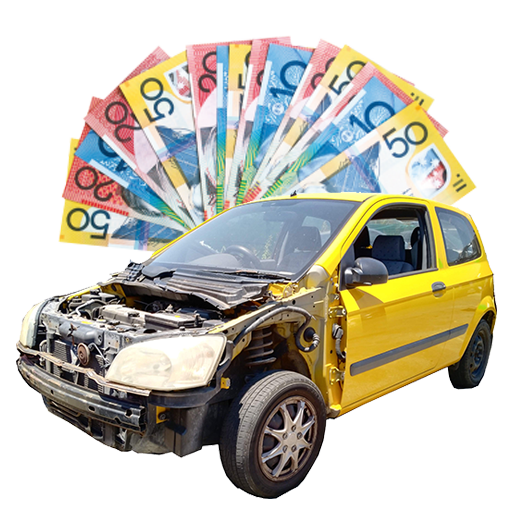When you're ready to sell your car, you'll find yourself at a crossroads: do you chase the highest possible price, or do you opt for the quickest, most hassle-free sale? This is the core dilemma every seller faces. Your main avenues are a private sale, a dealership trade-in, or using an instant online buyer.
Each path has its own set of pros and cons, and the best one for you really hinges on what you value most—your time or your money.
Finding the Best Place to Sell Your Car
Let's be honest, there's no single "best" way to sell a car that works for everyone. It all comes down to your personal situation and what you're trying to achieve.
If speed is your top priority, trading your car in at a dealership is hard to beat. You can literally drive in with your old car and drive out with a new one on the same day. The dealership handles all the paperwork, making it incredibly convenient. The catch? That convenience comes at a price. Trade-in offers are almost always lower than what your car is actually worth on the open market.
On the flip side, selling privately is where you'll make the most money. By cutting out the middleman, you get to set the price and negotiate directly with potential buyers. This route demands more of your time and effort, though. You're responsible for everything from writing the ad and taking photos to fielding calls, arranging test drives, and handling the final paperwork. If you're willing to put in the work, we've got a detailed guide on how to sell your car privately that walks you through maximising your profit.
The image below gives you a quick visual breakdown of how these options stack up in terms of price, time, and associated fees.
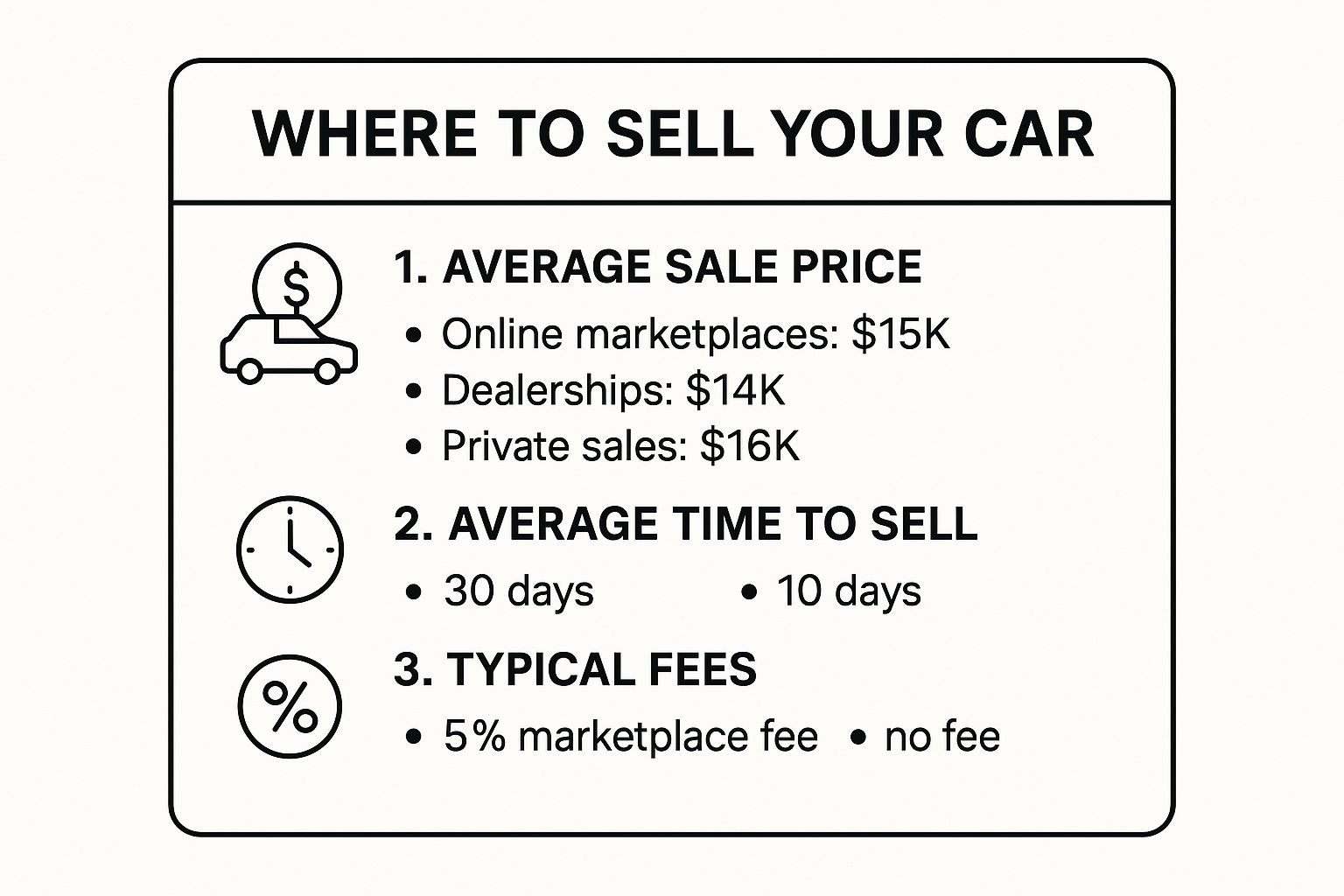
As you can see, the private sale route has the highest potential payout but also takes the most time. Dealerships offer instant gratification but for a lower price.
Selling Options Compared Price vs Convenience
To help you decide, let's lay out the key differences in a straightforward way. Think of it as a balance between cash in your pocket, the speed of the transaction, and the amount of work you're prepared to do.
| Selling Method | Potential Price | Speed of Sale | Level of Effort |
|---|---|---|---|
| Private Sale | Highest | Slowest (Weeks/Months) | High |
| Dealership Trade-In | Lowest | Fastest (Same Day) | Low |
| Instant Online Buyer | Medium | Fast (1-3 Days) | Very Low |
Ultimately, the right choice is a personal one. If you need cash quickly for a deposit on a new car, a dealership or online buyer might be the perfect fit. But if you have the time and patience to see it through, a private sale will almost certainly leave you with more money in the end.
Getting Your Car Ready to Impress and Sell
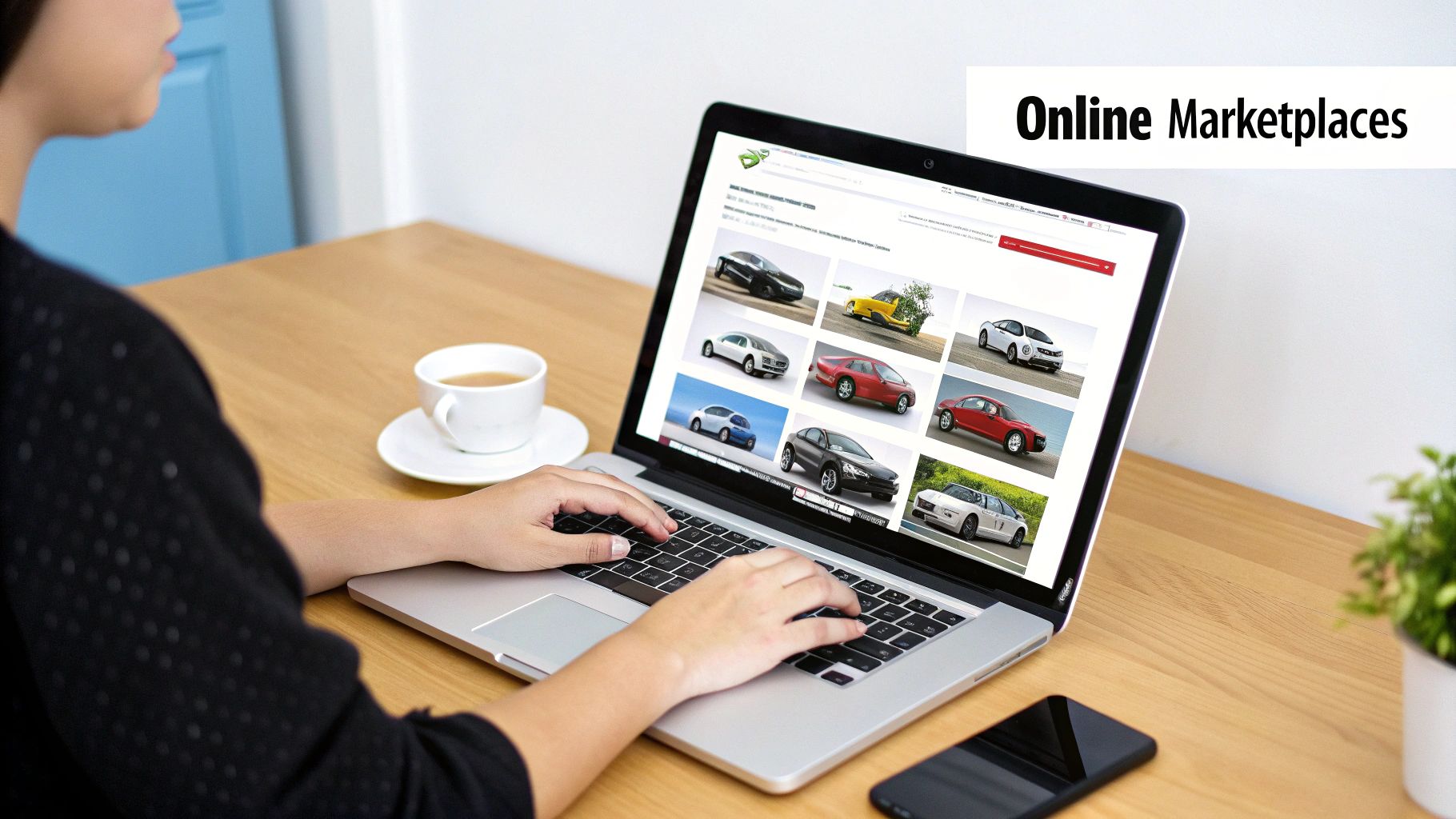
When it's time to sell, that first look a potential buyer gets is absolutely crucial. A bit of elbow grease at this stage can genuinely add hundreds, if not thousands, to your final sale price. Put yourself in their shoes: a sparkling, well-presented car feels like a well-cared-for car.
This means more than just a quick trip through the local car wash. You need to get into the details buyers always spot. Think about the scuff marks on the door sills, the dust that’s settled deep in the air vents, and the stubborn brake dust on the wheels.
A pristine interior makes a massive difference. If you're dealing with lingering smells or tough stains, a professional interior deep cleaning can be a smart move. It’s a small investment that often pays for itself by fetching you a much better offer.
Get Your Paperwork in Order
Nothing says "trustworthy seller" like having all your documents ready to go. Before you even think about listing your car, pull together all the important paperwork. It’s a simple act that shows you’ve got nothing to hide and have looked after the vehicle properly.
Make sure you have these essentials on hand:
- The original logbook: This tells the car's life story and service history.
- Service and repair receipts: Got a new timing belt or fresh tyres? Keep the proof.
- Registration papers: This is non-negotiable proof that you actually own the car.
A complete and neatly organised service history can easily boost a used car’s value. It takes the guesswork out of the equation for the buyer and gives them the confidence to meet your asking price.
Tackling Minor Fixes and Roadworthy Certificates
Don't give buyers an easy reason to haggle you down. Small cosmetic issues are often cheap and easy to fix, but they can cost you big time during negotiations. Taking care of minor scratches, stone chips, or a cracked tail light protects your asking price.
Finally, make sure you know the rules in your state regarding a Roadworthy Certificate (RWC). For sellers in places like Queensland and Victoria, getting an RWC is mandatory for most private car sales. Having it ready not only keeps you compliant with the law but also gives buyers huge peace of mind, making your car a far more appealing choice and helping to close the deal much faster.
How to Nail Your Car's Selling Price
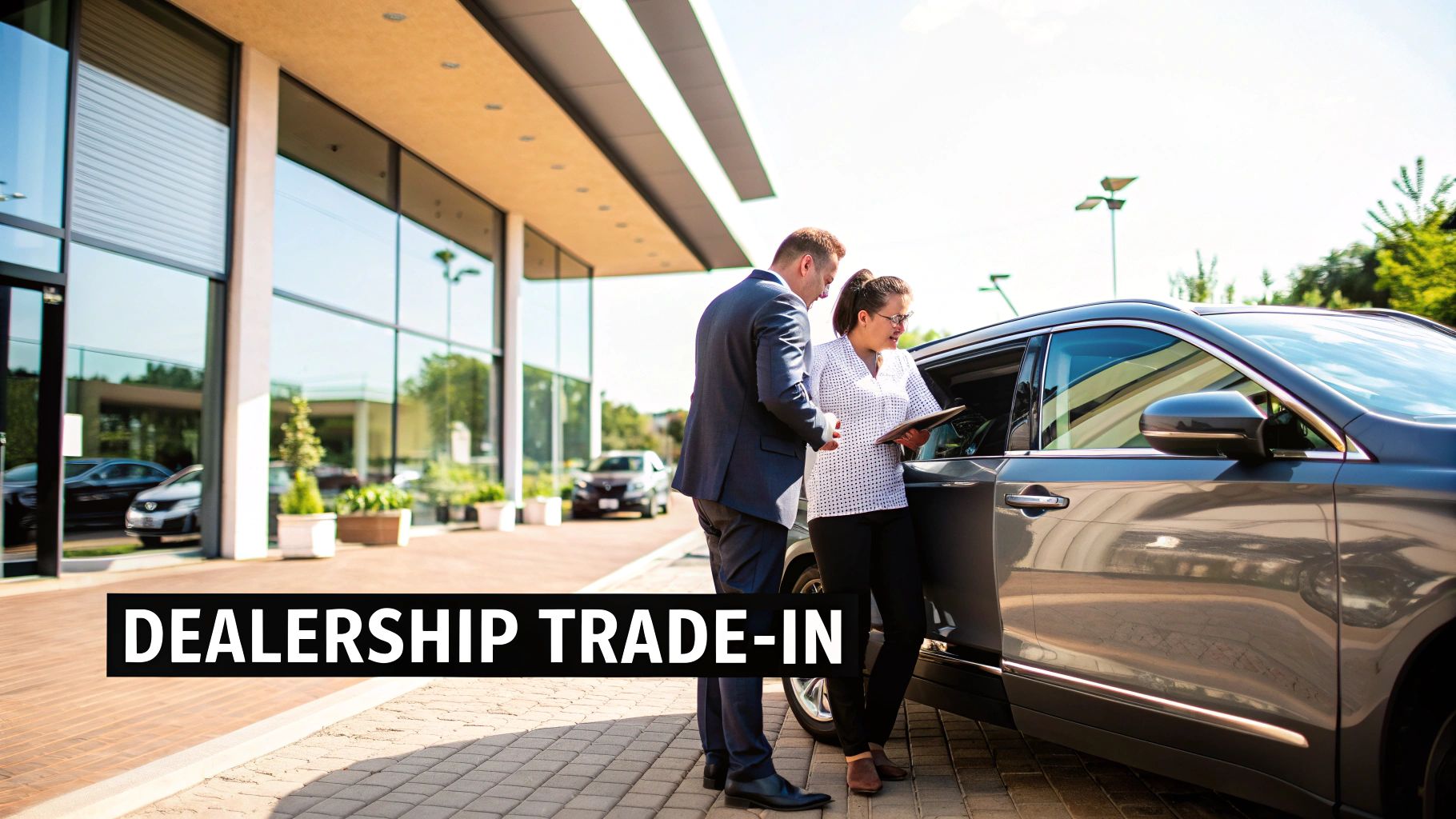
Pricing your car is a bit of an art. Go too high and your phone will stay silent. Price it too low, and you're just giving away cash. The trick is hitting that perfect number that gets buyers interested without short-changing yourself.
Before you do anything else, get a solid baseline. Jump onto a trusted valuation site like RedBook. These tools give you a free, data-driven estimate based on the basics: make, model, year, and kilometres. It’s a great, unbiased place to start before you dive into the finer details of your specific car.
But let's be real, a computer-generated number is only half the picture. The real world is where your car’s true value is decided.
Do Your Homework on the Live Market
Now it's time to play detective. To figure out what people are actually paying for cars like yours right now, you need to see what's out there. Spend a good half-hour scrolling through listings on sites like Carsales and Gumtree.
You’re looking for your car's twins. Filter your search to find vehicles that match yours as closely as possible:
- The same make, model, and year.
- Kilometres within a 10,000 km range of yours.
- The same transmission (auto vs. manual).
- Similar condition – and be honest with yourself on this one.
This little bit of research shows you the current going rate in your area. Find at least five cars that are a close match and see what they're listed for. You'll quickly spot a pricing trend. If your car is older or has seen better days, it's also smart to know its scrap value. A junk car value calculator can give you a quick idea of a realistic bottom-dollar price.
Keep in mind that the asking price is rarely the final sale price. Most private sellers expect a bit of haggling, so they usually build a small buffer into their price. It's a good idea for you to do the same.
Dialing in the Final Number
Okay, now think about what makes your car special. Does it have a full, documented service history? That's a huge plus. Desirable extras like a sunroof, a top-tier sound system, or even being a popular colour can all justify bumping the price up a little.
On the flip side, you have to be realistic about any faults. Obvious scratches, balding tyres, or a missing logbook will drag the value down. By balancing everything—the online valuation, what similar cars are selling for, and your car’s unique good and bad points—you can land on a competitive price that feels right and gets you a fast, successful sale.
Navigating the Top Car Selling Platforms
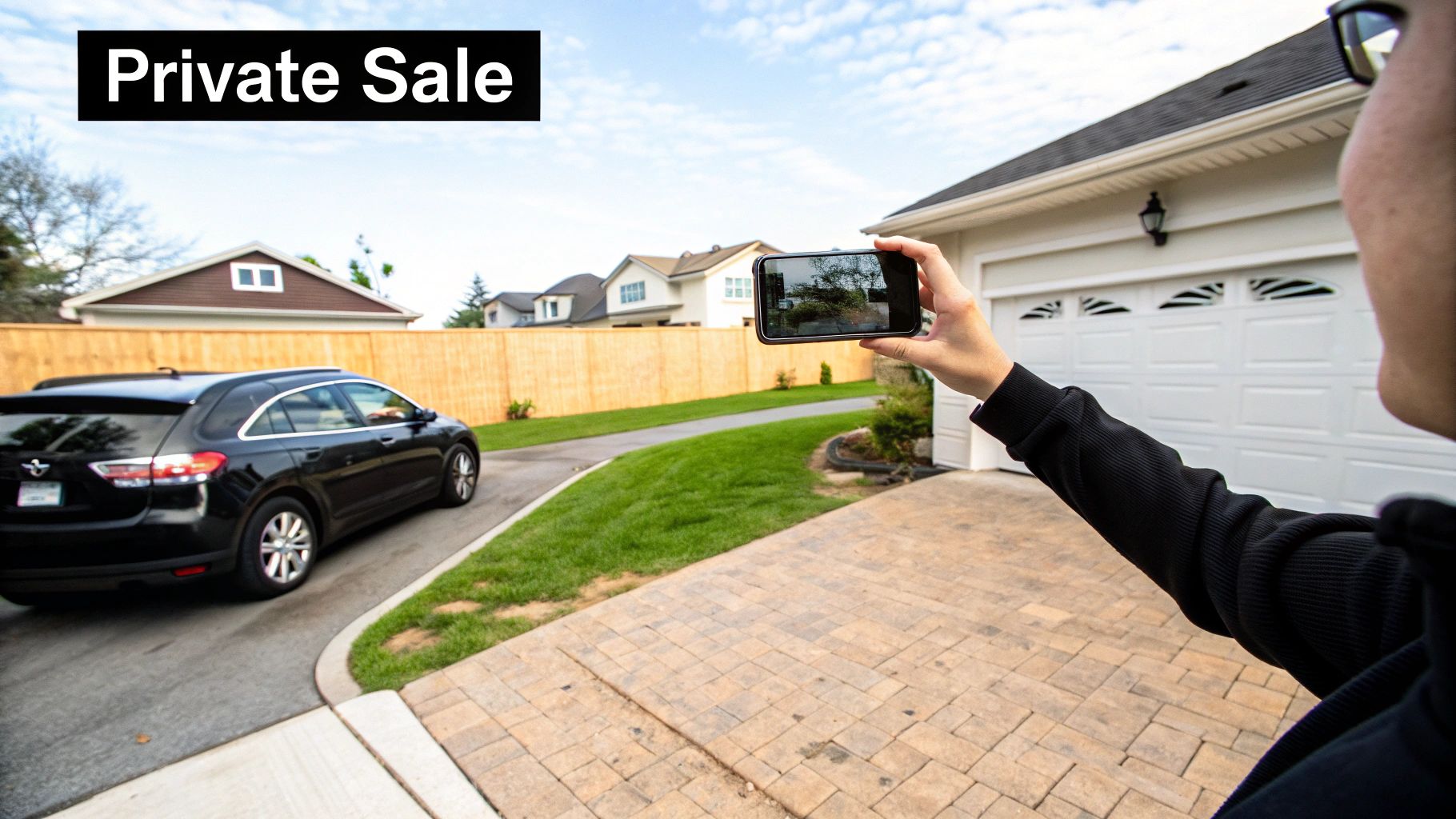
Alright, your car is gleaming, you've got all the paperwork in a neat pile, and you have a realistic price in mind. Now for the big question: where do you actually sell it?
This isn't just about picking a website. Where you choose to list your car for sale in Australia is a strategic move that directly affects how much cash you’ll pocket, how quickly you'll get it, and honestly, how much of a headache the whole process will be.
In Australia, you'll almost always get the best price through a private sale—we’re talking potentially 10-15% more than a dealer might offer you for a trade-in. The catch? You're trading that extra cash for your time. Private sales can take anywhere from 30 to 60 days from listing to sold.
Dealerships are the polar opposite. They offer speed and convenience, often wrapping things up in a day or two, but you’ll definitely take a hit on the price.
The Big Players in Private Sales
If getting top dollar is your main goal, then the private market is where you need to be. Each platform has its own crowd, so it helps to know where your car will fit best.
- Carsales: Think of this as the premier destination for serious car buyers. People on Carsales have done their homework and are usually ready to buy, but they expect a top-tier ad with loads of detail and professional-looking photos.
- Gumtree: As a general marketplace, Gumtree is fantastic for older or more affordable cars. You'll likely sift through a few low-ball offers and tyre-kickers, but the lower listing fees make it a solid, budget-friendly option.
- Facebook Marketplace: For sheer local reach and zero listing fees, you can't beat it. It's a casual environment, which means more time-wasters, but I've seen well-priced, popular models get snapped up in a matter of hours.
No matter where you list, a killer ad is non-negotiable. A compelling description that tells a story—highlighting the car’s best features, its service history, and its honest condition—paired with clear, high-quality photos, will always cut through the noise and attract genuine buyers.
The Trade-In and Instant Buyer Route
Feeling a bit overwhelmed by the thought of managing enquiries and organising test drives? There are much simpler ways to go.
Trading in your car at a dealership is the classic, no-fuss option, particularly if you're buying your next car from them. They simply deduct your car's value from the price of the new one. Easy.
A more modern take on this is the instant car-buying service. These companies give you an online valuation, and if you like the number, they'll inspect the car and buy it from you within a few days. The offer will sit somewhere between a trade-in and a private sale—less cash, but a whole lot more convenient.
Ultimately, the best platform comes down to what you value more: maximum cash in your pocket or a quick, painless sale. For a complete walkthrough of the entire journey, our guide on how to sell a car covers every step in detail.
You might not think your postcode matters when selling a car, but it absolutely does. A car's value isn't a fixed number across Australia; it can swing quite a bit depending on whether you're in a bustling city or a quiet country town.
Getting a handle on these local market quirks is crucial. It helps you set a price that’s actually realistic and figure out the best place to list your vehicle.
Big City Demand vs. Regional Needs
It’s a simple case of supply and demand. Your car might pull in a much higher price in Sydney or Melbourne just because there are thousands more potential buyers packed into a smaller area. More eyes on your ad usually means a faster sale and, often, better offers. Trying to sell that same car in a small regional town means you're working with a much smaller buyer pool, which can drag the process out.
The numbers back this up. States with major city hubs really drive the market. New South Wales and Victoria, for instance, are the leaders in vehicle sales. In a recent year, NSW saw 373,924 new vehicles sold, with Victoria not far behind at 333,104. All that activity in the new car market spills over directly into the used car scene, making it far more competitive. You can discover more insights about the Australian vehicle market and its regional trends.
Here’s the thing: knowing your local market isn't just about population density. It's about what people actually need. A tough 4WD might get overlooked in inner-city Brisbane, but list it in country Queensland where it’s genuinely useful, and it could be gone in a weekend.
This is where you can be smart about your sale. Put yourself in the shoes of a typical buyer in your area. What are they driving?
- Inner Cities: Think small. Fuel-efficient compact cars and zippy hatchbacks are always popular where parking is a nightmare and commutes are short.
- Regional & Rural Areas: Utes and 4WDs are king. People need practical, durable vehicles that can handle country roads and hard work.
- Coastal Towns: Lifestyle is everything. SUVs and cars with tow bars or roof racks will always catch the eye of buyers who love boating, surfing, or camping.
Once you spot these local trends, you can shape your sales pitch. If you’re selling a ute in a farming community, you’re in a great position to ask for a strong price. On the other hand, if you're trying to sell that same ute in a city full of tiny laneways, you'll probably have better luck finding the right buyer on a nationwide online platform.
Finding the Right Home for Your Car
Let's be honest, not every car buyer is looking for the same thing. The person who needs a tough, dependable ute for the job site is worlds away from the city driver hunting for a zippy little hatchback. Getting this right from the start is the secret to a quick, profitable sale. It's all about knowing your audience.
Think about it: who is the ideal new owner for your specific car? Popular models like SUVs and utes are always in high demand right across Australia, which means they tend to hold their value well. For these, you'll likely get plenty of bites on major platforms like Carsales or even local go-tos like Facebook Marketplace, simply because so many people are looking for them.
Riding the Market Waves
The Australian car market is always changing, and if you pay attention, you can use these shifts to your advantage. Take the growing interest in electric vehicles (EVs) and hybrids, for instance. We're seeing more and more of them on the road, and the sales data shows they're grabbing a bigger piece of the pie each year.
If you’re selling a well-kept EV, you could command a great price in a major city where charging stations are common. Out in a regional area? It might be a bit of a harder sell. It's worth a look at the latest vehicle sales data to get a feel for what’s hot right now.
Of course, some things don't change. The Aussie love affair with the SUV is still going strong.
SUVs are still king, making up around 60% of the market. This massive popularity translates to a huge pool of potential buyers, which usually means a faster sale at a better price for you.
Playing to Your Car's Strengths
So, what's the game plan? If you’re selling a small, fuel-efficient sedan, you should probably focus your energy on places where city dwellers and first-time car buyers are looking.
Got something more specialised, like a heavily modified 4WD? Your best bet might be niche forums or dedicated enthusiast groups online. That’s where you’ll find someone who truly appreciates the money you've spent on upgrades and is willing to pay for them. By matching your car to the right buyer, you're not just selling – you're making a connection that gets the deal done faster.
Got Questions About Selling Your Car? We've Got Answers
Selling a car, especially for the first time, can feel like you're navigating a maze. A few common questions always pop up, so let's clear the air on the big ones.
Is a Roadworthy Certificate a Must-Have?
This one really comes down to where you live. If you’re selling privately in Victoria or Queensland, a Roadworthy Certificate (RWC) is non-negotiable – you simply can't sell your car without it.
In states like NSW, it's not always a legal requirement to transfer the registration, but I'd strongly recommend getting one anyway. Handing over a current RWC gives a buyer huge peace of mind and can make your car sell much faster. When in doubt, always give your local transport authority a quick call or check their website.
What Paperwork Do I Really Need to Have Ready?
At the bare minimum, you'll need your proof of ownership, the car's current registration papers, and the transfer form for your state or territory, all filled out correctly.
But if you want to get the best price, the secret weapon is the original logbook showing a consistent, full-service history. Seriously, a well-stamped logbook is like gold to a savvy buyer and can add hundreds, sometimes thousands, to your final sale price.
Do you have an old, broken, or unwanted car taking up space in Adelaide? Auto Removal Adelaide can help you get rid of it. We offer instant cash for your vehicle and provide free removal services. Visit us at https://autoremovaladelaide.com.au to get a quick quote.

